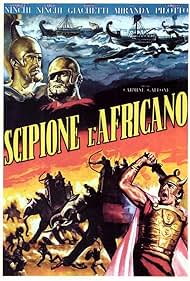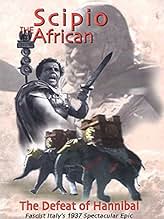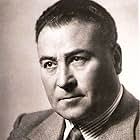A story of the Second Punic Wars, beginning with Scipio's futile pleas to the Roman Senate to build an army to battle Hannibal, that climaxes with the battle of Zama.A story of the Second Punic Wars, beginning with Scipio's futile pleas to the Roman Senate to build an army to battle Hannibal, that climaxes with the battle of Zama.A story of the Second Punic Wars, beginning with Scipio's futile pleas to the Roman Senate to build an army to battle Hannibal, that climaxes with the battle of Zama.
- Awards
- 1 win
Storyline
Did you know
- TriviaOne of the earliest known uses of the zoom lens.
- GoofsExtras wearing wristwatches, even though the film is set thousands of years before they were invented.
- ConnectionsEdited into La case du siècle: Cinecittà, de Mussolini à la Dolce Vita (2021)
Featured review
In this movie we have more sympathy for Hannibal with one eye (Camillo Pilotto) than for Scipio (Annibale(!) Ninchi) because Hannibal has so much pathos. Mussolini said: "Il cinema é l'arma piu forte". This movie received his personal "Mussolini cup" award for best Italian film of 1937, but one doubts if today this movie would be regarded as a propaganda-movie. Scipio won his last battle against Hannibal indeed, but by hurting elephants in a cruel way. There is a scene where a Roman officer prohibits a Roman soldier to launch his spear at a baby-elephant who was in the battle with his mother. It is a horrible sight to see an elephant receiving a spear in his eye, or falling down after having a spear in his leg. The elephants are crying out their pain and despair and one feels more pithy for them than for the dying soldiers. Anyway, the tactics of Scipio made it possible to let the elephants go through the lines of the hastari (Roman infantry) so they could not crash the Romans. At one moment in the battle the Gallic soldiers of Carthago (Spain was occupied by Carthago) fall back but Hannibal doesn't want them to fly and they are killed by the Carthagenian spears. The politics in the movie are well explained: the Council of the Elder of Carthago falling on their knees to have Hannibal back and the Roman Senate which is very angry because the Carthagenians break the truce. Some historical persons are not very clear (Captain Massinissa, Queen Sophonisba, King Syphace) but for the Italians of that time who knew their national history, included the Roman history, they will have understood their importance. The dialogues are realistic and they show also the relevance of the fact that the Carthagenians had more a mercenary-army and the Romans more an army of civilians. But at the end, both generals, Scipio and Hannibal cry the same: "Rome or Carthago or dead!". For the Carthagenians their future was at stake. Carmine Gallone, the director, made in 1960 thus 23 years later, another movie about Carthago: "Cartagine in fiamme". Was this a sequel?
Details
- Release date
- Country of origin
- Language
- Also known as
- Scipio Africanus: The Defeat of Hannibal
- Filming locations
- Production companies
- See more company credits at IMDbPro
- Runtime1 hour 23 minutes
- Color
- Sound mix
- Aspect ratio
- 1.37 : 1
Contribute to this page
Suggest an edit or add missing content


















